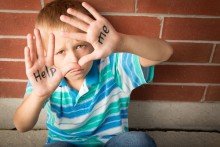Local safeguarding children boards, local authorities, NHS and police across Dorset are asking the public to be curious about the signs of neglect to help keep children safe.
Child neglect is the most frequent form of child abuse and is the most common reason for taking child protection action. Neglect is the on-going failure to meet a child’s basic needs including; food, clothing and shelter; a safe place to live; love, care and attention; education, health or dental care.
Currently, more than 50% of child protection plans across Dorset, Bournemouth and Poole are as a result of child neglect.
However, the number of children affected by neglect is far greater than those currently on child protection plans. Neglect issues may not always reach the threshold levels required for services to take child protection action, but instead in these cases, children’s social care and other agencies will work proactively with families to provide support and advice to address some types of neglect before they become more serious.
Sarah Elliott, the Chair of both the Dorset and Bournemouth & Poole Safeguarding Children Boards said: “Child neglect can be hidden within families and communities meaning that it doesn’t come to the attention of agencies, who are well placed to provide specialist help. That’s why we need the people of Dorset to also be our eyes and ears, to help spot the signs of neglect, so that timely support can be put in place for children and their families.
“Do not think; ‘it’s none of my business’, if you have concerns; be curious. Ask yourself; does a child’s behaviour, appearance or living situation worry you? If it does, then tell someone. It might make the difference between a child being safe or at risk of harm.”
Professionals who work with children and other members of the public are being asked to act against child neglect if they spot the signs and report concerns so that support plans can be put in place before problems escalate.
Spot the signs. Neglected children and young people may:
• be left hungry or dirty
• be left without adequate clothing, e.g. not having a winter coat
• be living in dangerous conditions, e.g. around drugs, alcohol or violence
• be living in a home that is indisputably dirty or unsafe
• be withdrawn or often be angry, aggressive or self-harm
• fail to receive basic health and/or dental care
• fail to receive medical treatment when they are ill or injured
Sarah Elliott continues: “Your concerns may seem small but you could have noticed something that someone else has missed, which could be part of the bigger picture to help keep a child or young person safe. With neglect cases often it is a build-up of little pieces of information from a teacher, doctor, the next-door neighbour, or others, which combined, lead to helping protect a child from neglect.
“There can be a number of reasons why families may be struggling to adequately care and provide for their children. Reporting your concerns does not mean a family will have their children taken away. It is always our aim to keep families together with support in place. When a report is made, social workers and others in children’s social services work with the family and other agencies to make sure a child or young person is safe and their needs are met.
“If you suspect a child is experiencing any form of neglect it is important you tell someone. Talk to someone who works with the child or young person such as a teacher, support worker or medical professional, or contact your local children’s social care services.”
Julie Campbell, NSPCC local campaigns manager in South West England, said: “Being a parent isn’t always easy and all parents struggle from time to time. Many parents don’t realise there is help out there, and we would encourage them to seek help before things get out of hand and children are put at risk.
“Where there are concerns about a child’s safety or well-being, most people find the decision to report these concerns a difficult one. They worry about overreacting or being wrong, and may question whether they have strong enough evidence, or if they have misread the signs of abuse or misunderstood a situation.
“They may also be concerned about the personal repercussions if they know the family involved. Some people don’t report suspected neglect because they think it might just be a one off. But even if that is the case, every child deserves to be protected – it is better to be safe than sorry. It may be nothing but it could be something.”
Visit: dorsetlscb.co.uk/child-neglect for more information and support and follow #ActOnNeglect on twitter.
Reporting Concerns:
If you think a child might be experiencing neglect, you can contact:
• Your local children’s social care on:
o 01202 458101 (Bournemouth)
o 01202 735046 (Poole)
o 01202 228866 (Dorset)
• The NSPCC helpline on: 0808 800 5000 or visit www.nspcc.org.uk/preventing-abuse/child-abuse-and-neglect/neglect/
•Dorset Police: dorset.police.uk/do-it-online or call 101. If you believe a child is in immediate danger, call 999.












